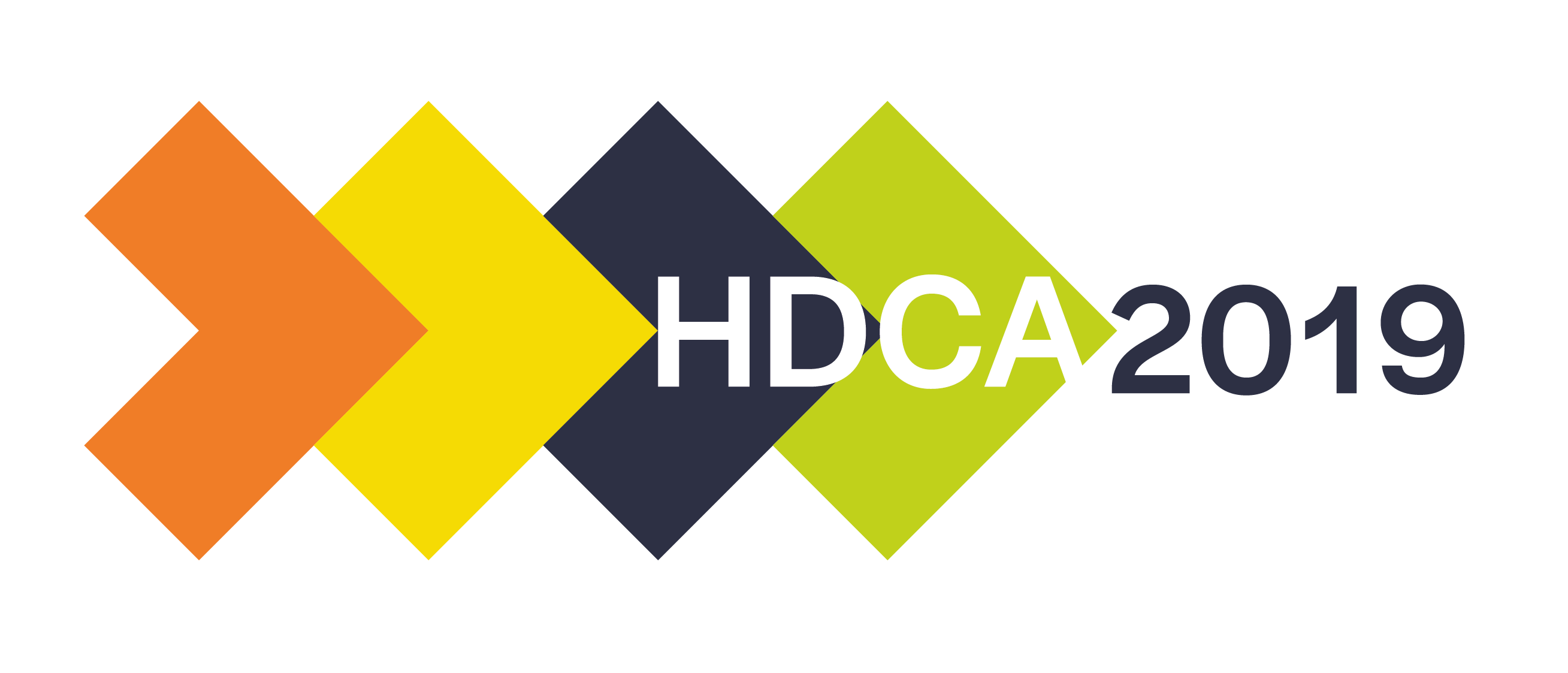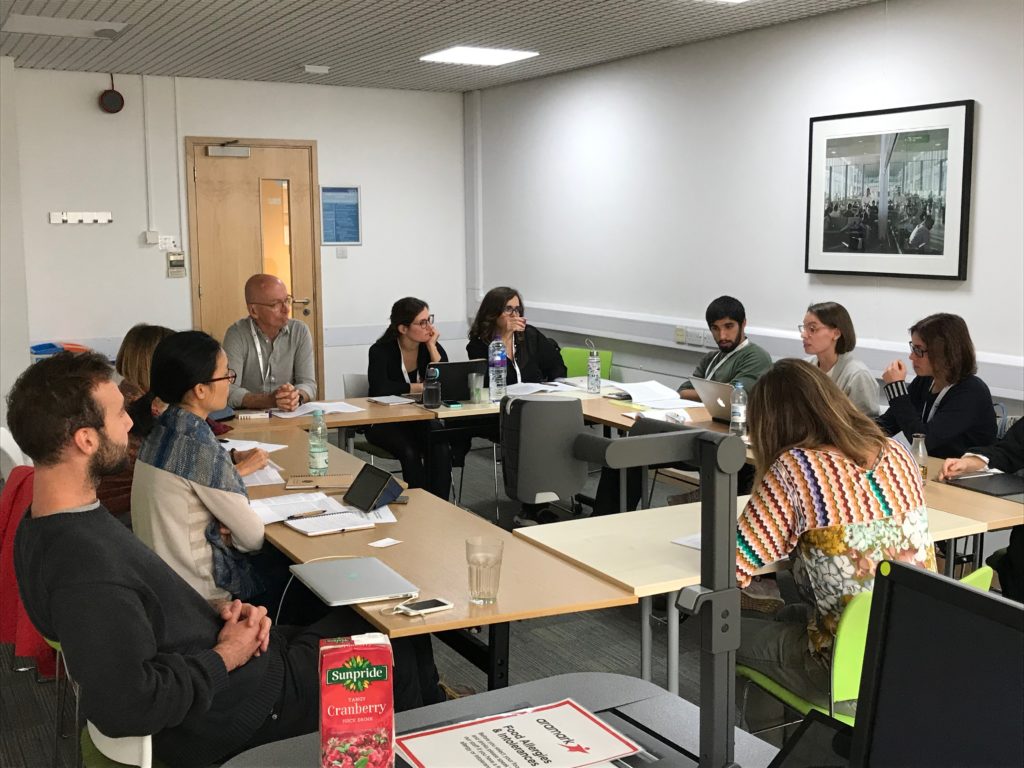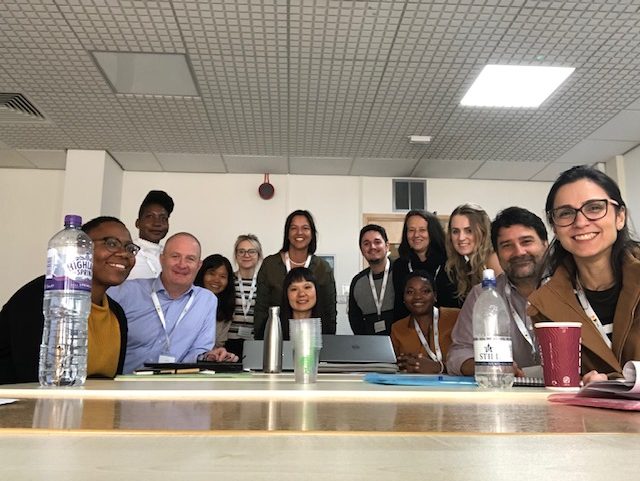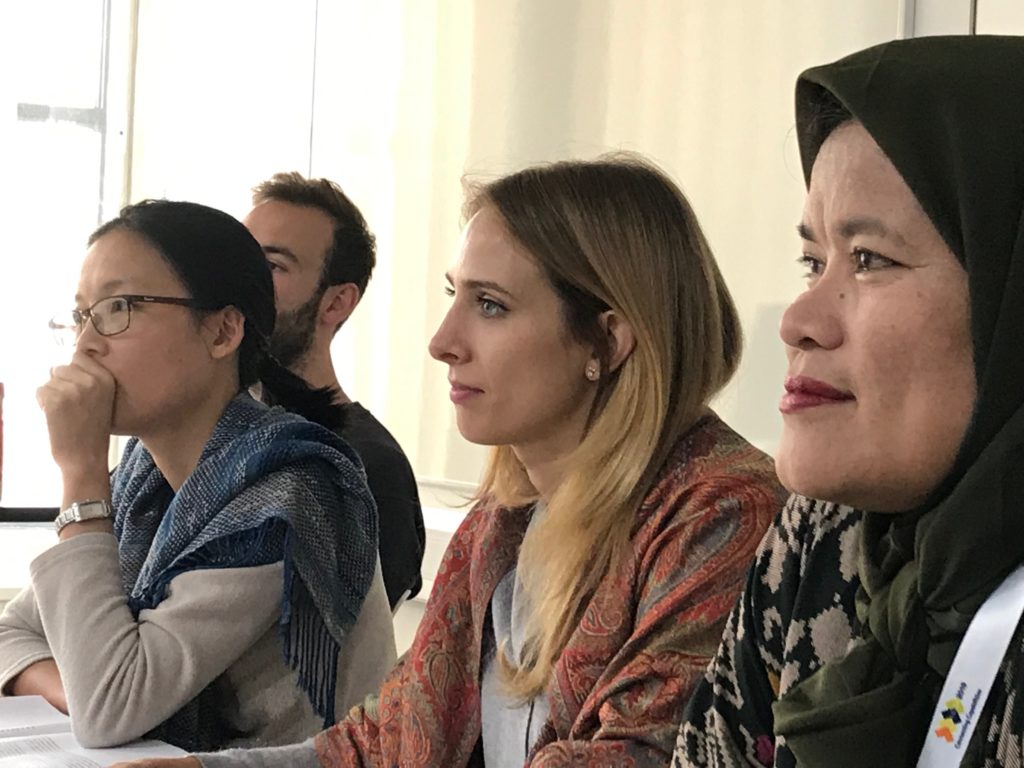2019 HDCA Conference – London, UK
2019 HDCA Conference Home Page
*THIS CONFERENCE HAS ENDED*
CLICK HERE TO VIEW VIDEO RECORDINGS OF THE KEYNOTE LECTURES
“Connecting Capabilities”
9-11 September, 2019
London, UK
Hosted by University College London
in partnership with the School of Oriental and African Studies (SOAS), Birkbeck, the University of East London (UEL) and the London International Development Centre (LIDC)
The 2019 HDCA Program Committee cordially invites scholars, government policy makers, practitioners and other interested parties from all over the world to participate in the 2019 HDCA conference. Original empirical research, theoretical issues, case-studies or reports of experiences, or findings from major research projects, and book panels relevant to conference theme or more broadly related to human development/capabilities approach will be presented.
Conference Theme
“Connecting Capabilities”
The theme for the HDCA 2019 conference in London (9-11 September 2019) is Connecting Capabilities. We have chosen this theme because we think connection is an important capability that needs further consideration.
March 2019 is the date currently scheduled for Brexit. In some ways this is a national political difficulty and time of uncertainty for the UK. But in other ways Brexit reflects themes that resonate internationally – not least the impact of globalisation and the emergence of greater xenophobia and more authoritarian forms of democracy in many parts of the world. The theme of connecting capabilities gives us an opportunity to think against this grain, using ideas and networks on human development and putting the capability approach to work in new ways.
Host Information/Committees
Programme Committee
- Co-ordinators: Elaine Unterhalter, Centre for Education and International Development (CEID), University College London and Ingrid Robeyns, University of Utrecht
- Alex Apsan Frediani, Development Planning Unit (DPU), University College London
- Mario Biggeri, University of Florence
- Tania Burchardt, Centre for Analysis of Social Exclusion (CASE), London School of Economics
- Caroline Hart, University of Sheffield
- Ann Mitchell, Catholic University of Argentina (UCA)
- Rosie Peppin Vaughan, Centre for Education and International Development (CEID), University College London
- Meera Tiwari, University of East London
- Sridhar Venkatapuram, King’s College London
Local Organising Committee
- Chair: Elaine Unterhalter, Centre for Education and International Development (CEID), University College London
- Paul Anand, Open University
- Alexandre Apsan Frediani, Development Planning Unit (DPU), University College London
- Jasmine Gideon, Birkbeck, University of London
- Jonathan Gross, King’s College London
- William Nicholas, Centre for Education and International Development (CEID), University College London
- Meera Tiwari, University of East London
- Elisa Van Waeyenberge, School of Oriental and Africa Studies (SOAS), University of London
Keynote Speakers
CLICK HERE TO VIEW VIDEO RECORDINGS OF THE KEYNOTE LECTURES
Keynote speakers
- Professor Martha C. Nussbaum – Ernst Freund Distinguished Service Professor of Law and Ethics, University of Chicago.
Keynote title: ‘’Reconciliation after Conflict: Britten’s WAR REQUIEM and the Body’ - Dr Vandana Shiva (Sen Lecture) – Scholar, environmental activist, food sovereignty advocate and author
- Professor Leif Wenar (Nussbaum Lecture) – Chair of Philosophy & Law at King’s College London
- Dr. Rupert Read (Mahbub Ul Haq Lecture) – Extinction Rebellion
- Panel with activists and practitioners reflecting on using the capability approach including Dr Gautam Bhan, Indian Institute for Human Settlements, and Johannes Krassnitzer, United Nations Development Programme (UNDP)
Conference Programme
The full programme can be downloaded here.
Monday, 9 September
8:00 am – 9:00 am Registration / Welcome coffee, UCL Institute of Education
9:00 am – 9:30 am Opening Ceremony and Welcome, Logan Hall, UCL Institute of Education
9:30 am – 10:30 am
Plenary session I: Sen Lecture
“Oneness VS the 1%: Creating equality in times of inequality, creating solidarity in times of polarization”
Vandana Shiva
Logan Hall
10:45 am – 12:15 pm Parallel Sessions, UCL Institute of Education and SOAS
12:15 pm – 1:15 pm Lunch
1:00 pm – 2:00 pm Thematic Group meetings, Institute of Education
2:00 pm – 3:30 pm Parallel Sessions, UCL Institute of Education and SOAS
3:30 pm – 4:00 pm Tea and coffee break
4:00 pm – 5:30 pm Parallel Sessions, UCL Institute of Education and SOAS
5:45 pm – 7:15 pm
Plenary session II
“Reconciliation after Conflict: Britten’s War Requiem and the Body”
Martha Nussbaum
Logan Hall
Tuesday, 10 September
8:00 am – 9:00 am Meet the Editors – How to write and publish papers for academic journals, Elvin Hall, UCL
9:00 am – 9:30 am Regional Network meetings
9:40 am – 10:50 am
Plenary session III: Mahbub Ul Haq Lecture
Dr. Rupert Read, Extinction Rebellion
Logan Hall
11:00 am – 12:30 pm Parallel Sessions, UCL Institute of Education and SOAS
12:30 pm – 1:30 pm Lunch
1:30 pm – 2:30 pm Thematic Group meetings, Institute of Education
2:30 pm – 4:00 pm Parallel Sessions, UCL Institute of Education and SOAS
4:00 pm – 4:30 pm Tea and coffee break
4:30 pm – 5:30 pm
Plenary session IV: Plenary Panel
“Collective Action and Capabilities”
Panelists: Johannes Krasnitzer, UNDP; Patrizio Bianchi; Gautam Bham; Tanya Charles
Logan Hall, Brunei Gallery
5:45 pm – 7:00 pm
Plenary session V: Nussbaum Lecture
“The Development of Unity”
Leif Wenar
Logan Hall
7:30 pm – Late Conference Dinner, King’s Place
Wednesday, 11 September
8:00 am – 8:45 am Thematic Group Coordinators meeting
9:00 am – 10:30 am Parallel Sessions, UCL Institute of Education and SOAS
10:30 am – 10:45 am Tea and coffee break
10:45 am – 11:45 am Poster presentations, Elvin Hall, UCL Institute of Education
11:45 am – 12:30 pm Graduate Student Network meeting
12:30 pm– 1:15 pm Lunch
1:15 pm – 2:15 pm HDCA members meeting, Logan Hall
2:15 pm – 3:45 pm . Parallel Sessions, UCL Institute of Education and SOAS
3:45 pm – 4:15 pm Tea and coffee break
4:15 pm – 5:30 pm
Plenary session VI: Amartya Sen in Conversation with Elaine Unterhalter
Film and panel discussion
Discussion chaired by Ingrid Robeyns
Logan Hall
5:30 pm – 6:00 pm Closing ceremony, Logan Hall
Pre-conference Events
FRIDAY, SEPTEMBER 6 – SATURDAY, SEPTEMBER 7 2019
Pre-Conference Event – ‘Development Practice: Connecting Capabilities’
Overview
On Friday 6th and Saturday 7th September we will hold the 2019 HDCA Pre Conference Event, Development Practice: Connecting Capabilities. These sessions offer the opportunity for conference delegates to engage with grassroots organisations working on a range of issues, including child poverty, FGM, period poverty, foodbanks, forced migration and homelessness. These are problems experienced by at least 10 percent of people in London, but in East London in particular. We have worked with some of these organisations in the last eight months to create a network of development practitioners. The culmination of this process will be the sharing of practice and collective learning, in relation to the Capability Approach, for this event. The participants will share experience and practice through testimonials and narratives: capturing challenges, how to address multiple deprivations, and pathways to change.
Also taking part will be a range of UK-based arts and cultural organisations – each of which is committed to a social mission, and seeking new ways to build coalitions beyond the traditional boundaries of the arts. Part of the aim of these Pre-Conference events will be, precisely, to connect the capabilities of organisations and communities of different kinds. Speaking to the 2019 conference theme, ‘Connecting Capabilities’, these sessions will explore possibilities for new connections, and support the development of collective capabilities in the cause of progressive change.
Further Information
Based on two preparatory meetings, an emerging network of development practitioners doing work in the UK and internationally have discussed their interests in engaging with a series of collective learning activities. The scope and objectives of the activities are as follows.
Friday, September 6th 2019: Event 1 – Network Workshop
Time: 2.00pm – 5.00pm
This is a workshop between members of the emerging UK network, to share experiences and insights from their work, and to prepare for the larger meeting on Saturday 7th 2019. In this session we will reflect upon and discuss the following questions:
- How do development programmes identify valuable capabilities?
- What kind of categories of capabilities are important to people?
- How do the lessons from your development initiatives relate to discussions around basic lists of capabilities, and processes of public deliberation to identify/prioritise/ground capabilities?
- How do development initiatives enable empowering processes that support people to realise their capabilities over time?
- How do development initiatives trigger self-reflection and critical awareness among marginalised groups in ways that expands their capabilities?
- How do development initiatives recognise the relationships between individuals and the communities / groups that shape their capabilities?
- Do communities / groups provide enabling conditions for individuals to realise aspirations?
Saturday, September 7th 2019 – Pre-conference event: ‘Development Practice: Connecting Capabilities’
9.30am – 10.00am: Coffee and welcome
Session 1: Experiences
10.00 am – 12.00 pm
This session seeks to open a space for people experiencing – and responding to – processes driving the deprivation of capabilities in London. The session will involve a series of testimonials, providing narratives responding to the following questions:
- What does positive change mean to you, your community or organisation?
- How is change being pursued?
- What are the main challenges faced in achieving change?
Session 2: Practices
1.00pm – 3.00pm
During this session, the key findings from the discussion of the previous day in relation to the learning questions will be shared with participants of this larger event. This will be followed up by a world-café type of event, where all attendees will be able to share their own experiences related to the three learning questions discussed during the smaller Friday event.
Session 3: Coalitions
3.30 pm – 5.30 pm
This final session will be run as an Open Space event – in which participants will be invited to identify key issues that they are keen to discuss further, and to lead these discussions themselves in a series of groups. Framing the session, however, will be a particular focus on connecting capabilities. How can we work together in the future? How can we build coalitions, support each other, and connect our capabilities in the cause of progressive change?
Graduate Students Network Meeting and Social
Date: Saturday, 7th September 2019
Event summary
Get to know other graduate students / early career researchers who are using the Capability Approach in their research. Starting with a short introduction where everyone will get to know each other, we will then have some light ice breaking games to get folks to mingle around. Venue: IoE. Room is to be confirmed. After the introduction activities we will have dinner together (at own cost) next door at Bloomsbury lanes. After dinner we can either do karaoke, bowling or both! (again, at own cost). Of course there is always an option to go back to your accommodation and have a little bit of rest, or to sit and watch. Whatever your decision is, we hope you will enjoy this opportunity to build your network and connections among our members before the conference.
SUNDAY, SEPTEMBER 8th , 2019
HDCA Pre-conference event: Black History Walk – Brixton (Two Times)
- Date: Sept. 8, 2019
- Time: 11:00 am – 1.00pm or 2:30 – 4:30 pm
- Meeting point: Ticket hall, Brixton tube station – by the maps, next to the ticket machine. Your guide’s name is Kelly.
- Cost: free of charge – but registration is essential.
Black History Walks offers guided tours, “to include the African history of London”. This two-hour tour will explore Brixton – an area often compared to New York’s Harlem, as the heart of the Black community. Like Harlem, Brixton is being heavily gentrified – but the African/Caribbean history is still evident if you have local knowledge. Your guide will take you through the main and back streets of the area and reveal:
– Black pioneers of the 1940’s
– Segregation British style: No Blacks, no dogs, no Irish
– Black economic independence: how to buy a house when the banks won’t lend to you
– British ‘Stop and Search’ compared to U.S ‘Stop and Frisk’
– Brixton Black Panthers
– Black British civil rights: who, what and where?
– Resistance or riots? Media and the black community
– World War 2: migration and rebuilding.
HDCA Pre-conference event: East London Walk
- Date: Sept. 8, 2019
- Time: 11.00 am – 1.00 pm
- Cost: free of charge – but registration is essential.
Our tour of East London will take us to areas inhabited by ‘vicious, semi criminals’ and the ‘well-to-do’, according to Charles Booth’s poverty maps. We will see houses now owned by contemporary conceptual artists originally built by wealthy Huguenot silk weavers seeking refuge from religious intolerance in France. Our walk will take in the sites of anti-racism rallies and early Victorian philanthropy and a church which became a synagogue then mosque.
HDCA Pre-conference event: Covent Garden Walk with Unseen Tours
Date: Sept. 8, 2019
Time: 2pm – 4pm
Cost: free of charge – but registration is essential.
Unseen Tours is a Social Enterprise working with homeless, ex-homeless and vulnerably housed Londoners which organises a range of walking tours in London. In this walking tour, you can explore the Covent Garden area with our guide Viv. Learn about the surprising history of Waterloo Bridge’s reconstruction during the Second World War and the connections of the area to pioneer scientist Michael Faraday. Discover Caspar, the Savoy Hotel’s mysterious cat guest, ghosts in the theatre district, the secrets of the Knights Templar and the location of London’s last remaining subterranean Roman bath. Hear about Viv’s personal connection to the building that houses the London Transport Museum and her experiences of homelessness in Covent Garden.
- Learn about Viv’s long and personal connection to Covent Garden
- Discover the ghostly history of the area
- Explore the hidden streets and alleys not seen by most tourists!
- The oldest restaurant in London
- The house that Dickens lived and worked in
- Learn about the trial of Oscar Wilde
HDCA Pre-conference event: Queer Tours of London – Bloomsbury
- Date: Sept. 8, 2019
- Time: 2:30 pm – 4.30 pm
- Cost: free of charge – but registration is essential.
Queer Tours of London (QTL) was set up to “commemorate, celebrate and agitate” for the 50th anniversary of the partial decriminalisation of homosexuality in the UK in 1967. The organisation seeks to “shine a light on London’s rich LGBTQI history through creative and life-affirming interactive tours. We tell the stories of London’s queer history, shedding light on the lives, spaces, identities, repression and resistance that form the backdrop of LGBTQI lives today.” QTL runs tours in many parts of the city, including Bloomsbury – the famous neighbourhood in which writers and thinkers such as Virginia Woolf and John Maynard Keynes lived and worked, and where the 2019 HDCA conference is based. This two-hour walking tour will be led by one of QTL’s guides, and participants will have the chance to learn about the queer history of the area, from gay socialists forming community spaces in the early part of the 20thCentury, to the campaigning work of Lesbian and Gays Support the Miners during the 1980s – as featured in the feature film Pride.
Workshop on Louis-Joseph Lebret and development ethics
Date: Sept. 8, 2019
Time: 9:00 am – 12:30 pm
9:00 – 9:15 Introduction/Introductions – Des Gasper (Erasmus University Rotterdam), Lori Keleher (New Mexico State University)
9:15 – 10:30
- Des Gasper – The Trajectory of L-J. Lebret: Questions Arising for Development Ethics
- Lori Keleher – Toward an Integral Human Development Ethics
- Montserrat Culebro (PhD, Universidad de Salamanca) – Denis Goulet’s development ethics in the XXI Century
10:30 – 10:50 Break
10:50 – 12:00 Panel 2
- Alex Apsan Frediani (University College London) – Lebret, SEGMACS and Urban Development in Brazil
- Jérôme Ballet (Université de Bordeaux) – A Page of Development Ethics: From Louis-Joseph Lebret to the Abidjan School and Beyond
- Rebecca Gutwald (Munich School of Philosophy) – Basic Human Needs in the philosophy of Louis-Joseph Lebret
12:00 – 12:30 General Discussion
Louis-Joseph Lebret (1897-1966) was a French Dominican priest, economist, development planner and philosopher. He founded the movement Economie et Humanisme in 1941. From the late 1940s it extended attention to Latin America, and later to Africa and Asia. He founded institutes/organizations and published numerous book. Lebret significantly influenced Denis Goulet, the American philosopher-social planner, and the progressive social doctrines of the Catholic Church, including in Gaudium et spes and Populorum Progressio. Lebret seems too little known in English-language development ethics.
This workshop aims to (1) start to better map Lebret’s work for Anglophone audiences, (2) look at impacts and parallels in Anglophone development ethics, Catholic social thought, and work on ‘integral human development,’ (3) to lay the ground for future discussions and a journal special issue.
Development Ethics Knowledge Exchange: Practitioners – Students – Researchers
- Date: Sept. 8, 2019
- Time: 1:30 pm – 6:00 pm
Program:
1:30-2:00 Jay Drydyk (Carleton University) and Lori Keleher (New Mexico State University): Interrogating development with The Routledge Handbook of Development Ethics
2:00-2:30 Educator session: A case study project at MPhil level, Shashi Motilal (Delhi University)
2:30-3:30 ‘Lightning’ presentations (+/- 5 minutes each)
3:30 – 4:00 Coffee Break
4:00 – 5:00 Anna Malavisi (Western Connecticut State University): The Toolbox Dialogue Initiative: Theoretical discussions among and with practitioners
5:00 – close
Closing discussion: next steps for collective action (led by Eric Palmer)
The program begins with an introduction by Jay Drydyk and Lori Keleher the editors of the Routledge Handbook of Development Ethics (2019) outlining some critical questions about development that are raised and supported by the Handbook with the goal of knitting together the discussion of development practitioners, educators and students, and academic authors.
Two invited presentations showcase activities developed for engaging students and practitioners in similar discussions. First, Shashi Motilal presents a case study project used in an MPhil class at Delhi University. Later, Anna Malavisi, presents the Toolbox Dialogue Initiative (TDI), a research project that facilitates communication and collaboration in cross-disciplinary research and practice. These presentations are supplemented with brief ‘lightning talks’, during which practitioners and educators present similar activities that they have developed, led, or participated in.
The closing discussion session will provide a brainstorming opportunity collective projects and a space for developing liaison among scholars, educators and practitioners. Session organizers intend that participants will carry their conversations into the main event of the HDCA, building alliances and settling plans by the end of those meetings.
HDCA Summer School
Thanks to all who taught and attended the 2019 Summer School!
Friday 6 and Saturday 7 September 2019
UCL Institute of Education, London.
Summer School Programme
The summer school aims to develop participants’ knowledge and understanding of key concepts in human development with a particular focus on the capability approach. Caroline Sarojini Hart and Rosie Peppin Vaughan will lead the summer school, together with further special guest tutors. The two-day programme will include sessions on the nature of human development; foundational concepts in human development and the capability approach; inequalities and capabilities; education; health and connecting capabilities. There will also be workshop style sessions on developing research methods with opportunities for participants to present and discuss their own research projects and ideas. Accepted participants will be given pre-course preparation to do ahead of the summer school. All sessions will be in English.
Summer School Eligibility
The programme is specifically aimed at doctoral students and post-doctoral scholars who already have some understanding of development issues and are currently working with the capability approach. To be eligible for the 2019 HDCA summer school you need to be a current doctoral student or postdoctoral researcher (within 2 years of receiving doctorate) working with the capability approach.








